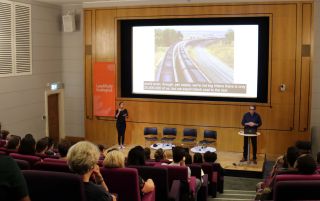Grief
Beyond Climate Grief
We can get past solastalgia, psychological eco-trauma, to act positively.
Posted August 11, 2023 Reviewed by Tyler Woods
Key points
- Eco-anxiety, climate grief, and other negative phrasing dominate many narratives today.
- Solastalgia (environmental change leading to psychological distress) can take over our feelings.
- Going beyond negativity galvanizes realistic anticipation of and actions for a better future.
Today’s headlines are regularly laden with global doom and destruction, even when science does not support this storyline. It affects our mental health and well-being, instilling terror and despondency. Instead, realism about the immense challenges and dangers can and should be balanced with realism about the huge opportunities for action and the successes we have already achieved.
After all, as from the movie version of The Hunger Games, “Hope: it is the only thing stronger than fear." Sadly, these words are intoned by President Snow, a ruthless, megalomaniacal, totalitarian dictator who murders children. He then continues, “A little hope is effective, a lot of hope is dangerous."
Hardly inspirational, yet brutally pragmatic. We should not underestimate the stark environmental and social perils due to our actions. Nor should we bypass the real hope that exists and that should spur us forward, so that “a lot of hope” becomes the norm rather than the danger.

Potent Words and Ideas
To exemplify, look no further than Glenn Albrecht’s ideas. Albrecht is an Australian academic who has led in action-oriented environmental philosophy and environmental psychology. He has a knack for coining potent words to express complicated and prevalent emotions.
He is often highlighted for inventing solastalgia, combining solace (or the Latin sōlācium), desolation, and algia (pain) to describe psychological distress, pain, and a loss of solace and sense of home experienced from environmental change. The notion has been applied to landscape loss due to resource extraction and anxiety from human-caused climate change, notably when undermining local environmental knowledges. No one, including Albrecht, denies these real emotions, nor their terrible toll on our mental health and well-being.
Albrecht has, nonetheless, led the way in seeking to move beyond solastalgia. Today's ceaseless barrage of negativity, fear, and gloom induces eco-anxiety and climate grief, irrespective of the actual environmental changes around us.
Instead, Albrecht wishes to progress positive action and constructive futures, which he proffers through a slew of more neologisms. Eutierria represents good feelings from linking individual and planetary life forces; an areligious oneness between a person and the Earth. Soliphilia draws on Yi-Fu Tuan’s "topophilia", or place attachment, to refer to love of place relationships leading to a commitment to keep them alive and prospering.
The Symbiocene
In 2000, the phrase “Anthropocene” was proposed to refer to the widescale changes that humanity has wrought on the planet, allegedly leading to new geological age or epoch in which we are the dominant force of change. This proposal was immediately followed by intense confusion and critical backlash, since geological epochs and ages are defined over millennia, so it is far too soon to judge. Then, it appeared uncertain if “Anthropocene” referred to geological changes, a geological (or wider environmental) and/or social boundary, a geological (or wider environmental) and/or social change process, a cultural concept, or a combination.
Dozens of alternatives ensued, from the Corporatocene to the Poubellocène, emphasising everything negative about the current era while generating further puzzlement. Others opted for new vocabulary to celebrate what we have achieved and to describe positive futures that we could actively create.
Among the latter is Albrecht’s "Symbiocene". Referring to companionship (from the Greek sumbiosis), the Symbiocene unsurprisingly seeks symbiosis, humanity and nature living together for mutual benefit. We can be governed by sumbiocracy, focusing on mutualism and invoking Earth emotions with human emotions to survive and thrive in tandem. Companionship with the Earth anchors climate hope, environmental excitement, and eco-inspiration (symbio-inspiration), notwithstanding Albrecht’s concern about adding “eco-” onto so many words, as if that improves their meanings.
Better Than President Snow
Machiavellian President Snow would not approve. Especially considering Niccolò Machiavelli’s most infamous and often misquoted line from The Prince, “…a question arises: whether it be better to be loved than feared or feared than loved? It may be answered that one should wish to be both, but, because it is difficult to unite them in one person, it is much safer to be feared than loved, when, of the two, either must be dispensed with” (from W.K. Marriott’s translation).
Albrecht’s work teaches the opposite—and he goes even further, from what he calls ‘hopium’ (not eco-hopium) to "radical anticipation". Not only can and should we accept fear and gloom and love, hope, and anticipation simultaneously, but we also can and should act so that radical and realistic anticipations overcome despondencies.
References
Albrecht, G.A. 2005. ‘Solastalgia’. A New Concept in Health and Identity. PAN: Philosophy Activism Nature, vol. 3, 41-55.
Albrecht, G.A. 2019. Earth Emotions: New Words for a New World. Cornell University Press, Ithaca, NY.
Albrecht, G.A. 2020. Negating Solastalgia: An Emotional Revolution from the Anthropocene to the Symbiocene. American Imago, vol. 77, no. 1, 9-30.
Gougsa, S., V. Pratt, B. George, C. Vilela, D. Kobei, S. Kokunda, I. Kelman, B. Eaton, L. Maina, S. Luari, O. Autti, K. Kerätär, J. Laiti, C. Baxendale, R. Raj, R. Deshpande, R. Gokharu, N. Singh, S. Ghelani, N. Mendu, A. Ahmad, and Land Body Ecologies research group. 2023. Land Body Ecologies: A case study for global transdisciplinary collaboration at the intersections of environment and mental health. The Journal of Climate Change and Health, vol. 10, article 100206.


